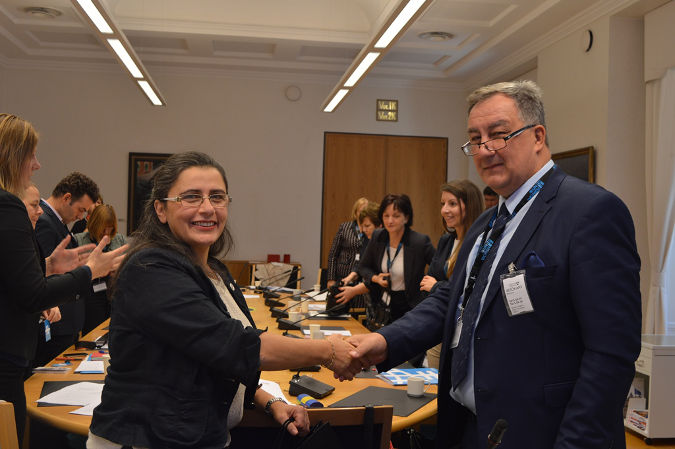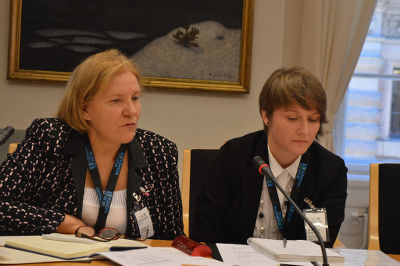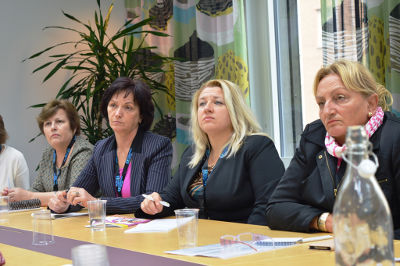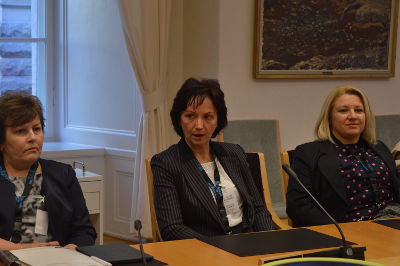Balkan and Moldovan MPs study Swedish gender equality first hand
UN Women brings Members of Parliament (MPs) from South-east Europe and Moldova to Sweden to learn first-hand about making gender equality central to government policies and budgets.Date:

Stockholm (Sweden)– MPs from Albania, Bosnia and Herzegovina, the former Yugoslav Republic (FYR) of Macedonia and Republic of Moldova visited Stockholm in October to learn about how Sweden mainstreams gender into government policies, budgets and political strategies.
The tour, which also included meetings with key institutions and bodies working on gender equality implementation, aimed to encourage strong parliamentary advocacy for gender responsive policy making in their home countries.
The delegation first visited the Swedish Parliament where participants learned of its main gender equality achievements and how it initiated gender equality laws.
At the Ministry of Foreign Affairs, the delegation studied the concept and objectives of Sweden’s Feminist Foreign Policy model and how these are integrated into Ministry and Government activities.
“This visit was extremely helpful,” said Mr. Mirsad Isaković, of Bosnia and Herzegovina’s Parliamentary Assembly. “We now see how gender mainstreaming functions if it is constantly pursued, and must think about how best to implement parts of the Swedish model in our country.”

At the Ministry of Health and Social Affairs, the main points of discussion were gender mainstreaming, gender-responsive budgeting and the reforms on taxation, pensions and parental leave that significantly contributed to changing gender roles and empowering Swedish women.
“We’d heard of Sweden's innovative reforms and approach in achieving gender equality, but had never seen it before practically,” said Ms. Vasilika Hysi, an Albania MP. “Discussing with Swedish government representatives and MPs pension, social care and paternity leave reforms was important.
“It’s simply good practice to bring more women into the labour market, ensure social care for all and build family wealth. The Foreign Feminist Policy is to be appreciated and welcomed and adopted by government institutions in Albania,” she said.

At the National Audit Office, the main topic of discussion was gender performance auditing. Afterwards, participants talked about doing something similar back home.
“Gender equality is the red thread in all Swedish policies and public documents. It is especially important to have disaggregated data that can be thoroughly analysed in developing policies,’ said Ms. Lidia Lupu from the Republic of Moldova.
“We return to Moldova with good impressions and firm ideas to implement the best practices learned in Sweden, as for example in social affairs,” added her colleague, Ms. Maria Ciobanu.

The meeting at the Discrimination Ombudsman made participants aware of systematic rights protection and complexities related to gender discrimination.
“Achieving gender equality requires that women and men policymakers join efforts to devise policies that fully respect human rights and gender equality principles. Equal opportunities should be multi-disciplinary and public services should have gender responsive policies and actions based on solid gender statistics and research,” said Ms. Jasminka Damceska, a Macedonian Parliament member.
“Sharing experiences between MPs from different countries and with our Swedish parliamentary colleagues made us aware that we should be more persistent in advancing women in politics and society. I will make every effort to use these new experiences in the work of our Parliament,” said her colleague, Ms. Shpresa Hadri.
The visit was supported by UN Women, in the framework of its regional programme, Promoting Gender Responsive Policies in South East Europe and the Republic of Moldova, generously funded by the Austrian Development Agency and Swiss Agency for Development and Cooperation.